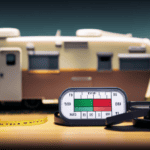Beginners Guides
How Much Does A 26 Ft Camper Weight

Imagine driving down the open road, with the wind blowing through your hair and the ability to discover new places. Before you begin this journey, there is one important question to consider: what is the weight of a 26 ft camper?
This is not just a matter of curiosity; it’s a vital piece of information that can significantly impact your travel plans. In this article, we will delve into the world of camper weights, exploring the average weight of a 26 ft camper and the various factors that can affect it.
From understanding the importance of weight distribution systems and trailer hitches to legal requirements and safety considerations, we will provide you with all the information you need to make an informed decision.
So, let’s dive in and unravel the mysteries of camper weight, ensuring you choose the perfect companion for your journey.
Key Takeaways
- The average weight of a 26 ft camper is typically between 5,000 and 7,000 pounds.
- Proper weight distribution and loading of items in the camper is crucial for stability and control.
- Exceeding camper weight limits can lead to structural damage, issues with the towing vehicle, and potential fines and penalties.
- Larger campers like a 26 ft camper generally weigh more and require a larger tow vehicle with a higher towing capacity.
Understanding the Importance of Camper Weight
So, you’re probably wondering why the weight of a camper is so important, huh? Well, let me tell you, understanding the importance of camper weight is crucial for a safe and enjoyable camping experience.
When it comes to camper weight, two factors are particularly significant: camper weight distribution and camper weight limits.
Proper camper weight distribution is essential for maintaining stability while towing. If the weight is unevenly distributed, it can lead to swaying, which can be dangerous, especially at high speeds. Additionally, an imbalanced weight distribution can put excessive strain on the tires, suspension, and brakes, increasing the risk of accidents.
Camper weight limits are set by the manufacturer and should never be exceeded. Going over the weight limit can cause structural damage to the camper and compromise its safety. It can also lead to issues with the towing vehicle, such as decreased maneuverability and braking capabilities.
Now, let’s talk about the average weight of a 26 ft camper.
Average Weight of a 26 ft Camper
To get an idea of the weight of a 26 ft camper, you might be surprised to find out that it typically falls within a certain range. The average weight of a 26 ft camper is around 5,000 to 7,000 pounds. However, it’s important to note that this is just an average and the actual weight can vary depending on the specific make and model of the camper.
When considering the weight of a 26 ft camper, it’s also important to take into account the distribution of the weight. The weight of the camper isn’t evenly distributed throughout its entire length. Typically, the front portion of the camper, which includes the bedroom and bathroom, tends to be heavier than the rear portion, which includes the kitchen and living area. This distribution of weight is important to ensure proper towing stability and prevent any potential accidents on the road.
Moving on to the next section about factors that affect camper weight, it’s crucial to consider various aspects such as the materials used, additional accessories, and personal belongings that are packed inside the camper. These factors can significantly impact the overall weight and should be taken into consideration when determining the suitability of a camper for towing.
Factors that Affect Camper Weight
Consider the various factors that impact the weight of your camper, as they can greatly influence your towing experience and overall safety. There are several key factors that affect the weight of a camper. These include the type of materials used in its construction, the size and number of appliances and amenities, the amount of water and fuel it can hold, and the weight of additional accessories and personal belongings. To give you a clearer understanding, let’s take a look at a table that breaks down these factors.
| Factor | Description | Impact on Weight |
|---|---|---|
| Construction Materials | Campers made with lightweight materials such as fiberglass tend to be lighter than those made with heavier materials like steel or aluminum. | Lighter materials result in a lighter camper overall. |
| Appliances and Amenities | The more appliances and amenities your camper has, the heavier it will be. These can include things like air conditioning units, refrigerators, and entertainment systems. | More appliances and amenities add to the camper’s weight. |
| Water and Fuel Capacity | The amount of water and fuel your camper can hold affects its weight. A full tank of water or fuel adds significant weight to the camper. | A full tank of water or fuel increases the camper’s weight. |
| Accessories and Personal Belongings | Additional accessories such as camping gear, bikes, and personal belongings can add extra weight to your camper. | The more accessories and personal belongings you carry, the heavier the camper becomes. |
Understanding these factors is crucial when measuring the weight of your camper. By considering these elements, you can accurately calculate the total weight of your camper, ensuring a safe and enjoyable towing experience. Let’s explore how to calculate the total weight of your camper in the next section.
Calculating the Total Weight of Your Camper
Understanding the factors that affect the weight of your camper is crucial, but did you know that the average camper can add up to 1,500 pounds of additional weight when fully loaded with water, fuel, and personal belongings?
To ensure you’re within the safe weight limits of your camper, it’s important to calculate its total weight accurately. Calculating the total weight involves considering the camper’s dry weight and estimating the payload weight.
The dry weight refers to the weight of the camper without any additional items or fluids. This information can usually be found in the manufacturer’s specifications or on a weight sticker located on the camper.
Estimating the payload weight involves taking into account the weight of all the items you plan to carry in the camper, such as camping gear, food, and personal belongings. You should also factor in the weight of water and fuel, as they can significantly contribute to the overall weight.
By accurately calculating your camper’s total weight, you can ensure that you’re not exceeding its capacity and maintain safe towing conditions. Exceeding the weight limits can affect your vehicle’s handling, braking, and overall safety.
Now let’s explore the impact of camper weight on towing capacity.
The Impact of Camper Weight on Towing Capacity
Ready to hit the road with your camper? Don’t forget that the weight of your camper can have a big impact on your towing capacity! It’s important to understand the implications of camper weight to ensure a safe and efficient journey.
One of the key factors affected by camper weight is fuel efficiency. The heavier your camper, the more fuel it will require to tow it. This can result in increased costs and more frequent stops at the gas station.
Additionally, the weight of your camper can affect the braking distance of your vehicle. A heavier camper means a longer braking distance, as it takes more force to bring the entire setup to a complete stop. This can be especially critical in emergency situations.
To ensure optimal safety and performance, it’s crucial to properly load and distribute weight in your camper. By evenly distributing the weight and placing heavier items lower and towards the front of the camper, you can achieve better stability and control while towing.
With these considerations in mind, let’s explore some tips for properly loading and distributing weight in your camper.
Tips for Properly Loading and Distributing Weight in Your Camper
To ensure a smooth and sturdy journey, make sure to load and distribute the weight in your camper like a skilled Tetris player, strategically placing heavier items lower and towards the front for optimal stability and control. Proper loading techniques and weight distribution tips are essential for a safe and enjoyable camping experience.
One effective way to achieve proper weight distribution is by using a three-column, four-row table to visually represent the ideal arrangement of items in your camper. This table can serve as a guide to help you evenly distribute the weight and prevent any imbalances that may affect towing and handling. Consider placing heavier items such as water tanks, batteries, and kitchen appliances towards the front and lower areas of the camper, while lighter items like bedding and clothing can be placed towards the rear.
By following these loading techniques and distributing the weight correctly, you can enhance the stability of your camper and improve towing performance. It’s important to note that overloading the rear of the camper can lead to poor handling and increased risk of sway.
In the next section, we will explore weight distribution systems and trailer hitches, which further aid in maintaining proper weight distribution and improving overall towing capabilities.
Weight Distribution Systems and Trailer Hitches
When towing a trailer, it’s crucial to invest in a reliable weight distribution system and trailer hitch that can help optimize stability and control. Weight distribution techniques play a vital role in ensuring that your camper is properly loaded and balanced, preventing issues such as swaying or sagging.
By selecting the right trailer hitch, you can effectively distribute the weight of your 26 ft camper across all axles, maximizing safety and performance.
A weight distribution system works by transferring some of the tongue weight from the rear axle of your towing vehicle to the front axle and the trailer’s axles. This equal distribution of weight helps to maintain proper balance and control, especially when navigating steep inclines or making sharp turns. It also helps to prevent excessive strain on your towing vehicle’s rear axle, suspension, and tires.
When selecting a trailer hitch, it’s essential to consider the weight capacity and compatibility with your camper. There are various types of trailer hitches available, including weight distribution hitches that come with built-in sway control. These hitches ensure that your camper remains stable and reduces the risk of dangerous trailer sway.
With the right weight distribution system and trailer hitch, you can confidently tow your 26 ft camper knowing that the weight is properly distributed and controlled.
In the next section, we will discuss the legal requirements and safety considerations for camper weight, ensuring that you comply with regulations and maintain a safe towing experience.
Legal Requirements and Safety Considerations for Camper Weight
Ensuring compliance with legal regulations and prioritizing safety are essential when considering the weight of your 26 ft camper. Legal requirements vary from state to state, so it’s important to familiarize yourself with the specific regulations in your area.
Generally, campers are subject to weight limits imposed by the Department of Transportation. These limits take into account factors such as the size and type of vehicle, as well as the capacity of the tires and axles. Exceeding these weight limits can result in fines, penalties, and even the impoundment of your camper.
In addition to legal requirements, there are also safety guidelines to consider when determining the weight of your camper. Overloading your camper can put a strain on your vehicle’s suspension, brakes, and overall stability. This can increase the risk of accidents and damage to your camper and vehicle. It’s important to distribute the weight evenly and make sure that your camper is properly balanced.
To ensure that you are within legal limits and adhering to safety guidelines, it’s recommended to consult your vehicle’s owner manual or contact the manufacturer for specific weight information. Additionally, there are online resources available that provide the weight specifications for various camper models.
By taking the time to research and understand the legal requirements and safety considerations, you can enjoy your 26 ft camper with peace of mind.
Resources for Finding the Weight of Specific Camper Models
Use online resources and manufacturer specifications to easily find the weight of specific camper models, helping you make informed decisions about your 26 ft camper.
When it comes to finding accurate and up-to-date weight information for camper models, there are several resources available that can assist you in comparing the weight of different options. Here are three valuable tools to consider:
-
Manufacturer Websites: Many camper manufacturers provide detailed specifications, including the weight, on their official websites. These websites often have search filters that allow you to narrow down your options based on size, type, and weight.
-
Online Forums and Communities: Joining online forums and communities dedicated to camping and RVing can be a great way to connect with experienced campers who can provide firsthand information about the weight of specific camper models. These communities often have threads and discussions where people share their experiences and knowledge.
-
RV Dealerships: Visiting RV dealerships in person can also be helpful in finding accurate weight information. Sales representatives can provide you with brochures, pamphlets, or access to online databases that contain detailed specifications, including weights, for various camper models.
By using these resources, you can easily find the weight of specific camper models and compare them to make an informed decision. In the next section, we will discuss the conclusion: choosing the right camper for your needs and budget, to help you make the best choice.
Conclusion: Choosing the Right Camper for Your Needs and Budget
Ultimately, selecting the perfect camper for your requirements and financial situation comes down to careful consideration of your needs and budget. When it comes to choosing the right camper size, it’s important to understand the cost implications of camper weight.
A larger camper, such as a 26 ft camper, will generally weigh more than a smaller one. This means that you may need a larger tow vehicle with a higher towing capacity, which can increase the overall cost. Additionally, a heavier camper may also result in higher fuel consumption, especially when traveling uphill or on rough terrains.
It’s essential to assess your needs and budget before making a decision. Think about how many people will be using the camper and what amenities you require. Consider the type of trips you plan to take and the locations you wish to visit. If you’re planning on frequenting campgrounds with size restrictions, a smaller camper may be more suitable.
Furthermore, evaluate your financial situation and determine how much you’re willing to spend on a camper and associated expenses like insurance and maintenance. Keep in mind that a larger camper may also require a larger storage space when not in use, which could incur additional costs.
By carefully considering these factors, you can make an informed decision and choose the right camper size that meets your needs and fits within your budget.
Frequently Asked Questions
What are some common mistakes people make when calculating the weight of their camper?
Common errors people make when calculating the weight of their camper include not accounting for additional accessories or modifications, relying solely on manufacturer specifications, and underestimating the weight of personal belongings.
To ensure an accurate calculation, it’s important to consider the weight of all items inside the camper, including furniture, appliances, and water tanks. Using a calibrated scale or consulting with a professional can help ensure a precise measurement.
Are there any legal requirements regarding the weight of a camper?
When it comes to legal requirements regarding camper weight, there are some important regulations to keep in mind.
In the United States, for example, each state has its own laws regarding towing and weight restrictions. It’s crucial to understand these rules to ensure you’re compliant and safe on the road.
Exceeding weight limits can result in fines, penalties, and even potential accidents. Therefore, it’s essential to thoroughly research and understand the legal requirements specific to your camper’s weight.
How does the weight of a camper impact its towing capacity?
Weight plays a crucial role in determining a camper’s towing capacity. Heavier campers typically have a lower towing capacity, as they put more strain on the towing vehicle’s engine and brakes.
Moreover, the weight of a camper also affects fuel efficiency, with heavier campers requiring more fuel to tow.
To achieve an ideal towing experience, it’s recommended to consider the weight of the camper and ensure it falls within the towing capacity of the vehicle.
What are weight distribution systems and trailer hitches, and why are they important?
Weight distribution systems and trailer hitches are essential for safe and efficient towing. Weight distribution systems help evenly distribute the weight of the camper and prevent excessive strain on the tow vehicle, ensuring better stability and control.
Trailer hitch installation involves attaching the hitch to the tow vehicle, providing a secure connection between the vehicle and the camper.
Both systems work together to enhance towing performance, reduce sway, and improve overall towing experience.
Where can I find the weight specifications for specific camper models?
Weight specifications for specific camper models can be found on the manufacturer’s website or in the owner’s manual. These specifications provide valuable information about the weight of the camper, including its dry weight, gross vehicle weight rating (GVWR), and cargo carrying capacity. Knowing the weight specifications is crucial for ensuring that your vehicle is capable of safely towing the camper and for understanding how much gear and supplies you can bring along.
Can the Weight of a Camper Affect the Likelihood of Mice Infestation?
The weight of a camper may indeed impact the likelihood of mice infestation. A heavy camper may cause cracks or openings in the ceiling, providing a pathway for mice. To avoid this, regular inspections and preventive measures like sealing potential entry points, installing mouse traps, and practicing proper hygiene are crucial for getting rid of mice in camper ceilings.
Conclusion
In conclusion, finding the right camper for your needs and budget requires careful consideration of its weight.
It’s fascinating to note that the average weight of a 26 ft camper ranges from 4,000 to 7,000 pounds, depending on various factors.
Understanding the impact of camper weight on towing capacity, as well as legal requirements and safety considerations, is crucial for a smooth and enjoyable camping experience.
Be sure to utilize resources available to find the weight of specific camper models and make an informed decision. Happy camping!
Jason is the author of Laienhaft, a blog for all things outdoor and camping. If you’re looking for the best tent to take on your next camping trip, or need some advice on how to get started with recreational camping, Jason has you covered. He’s also an expert on survival skills – if you’re ever lost in the wilderness, he’s the guy you want to find!
Beginners Guides
How To Make Curtains For A Camper

Tired of the sun’s strong rays and prying eyes invading your camper’s privacy and tranquility? Don’t worry, I have just the solution for you! Get ready to explore a realm of creativity and expertise as I show you how to make your own camper curtains.
These curtains will not only shield you from the harsh elements but also add a touch of style and personality to your home on wheels. With just a few simple steps, some fabric, and a little bit of time, you can transform your camper into a cozy oasis that reflects your unique taste.
So, grab your measuring tape and sewing machine, because we’re about to create curtains that will make your fellow campers green with envy. Get ready to let your imagination run wild and create curtains that are as unique and adventurous as you are!
Key Takeaways
- DIY curtains for a camper provide privacy and sun protection.
- Choosing the right fabric and design is important for both style and functionality.
- Proper measurement and planning are necessary for a successful curtain project.
- Curtain hooks, tiebacks, and holdbacks can enhance the look and functionality of camper curtains.
Measure and Plan Your Curtains
Now that you’ve measured your windows and planned your curtain design, you can move on to the next step in creating your camper curtains. The planning process is crucial for ensuring that your curtains fit perfectly and fulfill their purpose.
Start by gathering all the necessary tools, such as a measuring tape and a notepad, to record accurate measurements. When measuring your windows, keep in mind that curtains should cover the entire window for maximum privacy and light control. Take measurements of both the length and width, making sure to include any additional space needed for curtain rods or hems.
It’s also important to consider the type of curtain design you want, whether it’s a simple straight panel or a more intricate pleated style. Once you have all the measurements, you can start visualizing how your curtains will look and function in your camper. This planning process will help you make informed decisions when it comes to choosing the fabric and supplies for your curtains.
So, let’s move on to the exciting part of selecting the perfect fabric and supplies for your camper curtains.
Choose Your Fabric and Supplies
First things first, you’ll wanna pick out some groovy fabric and grab all the necessary supplies. Choosing the right fabric for your camper curtains is essential to achieving the look and functionality you desire. Consider the style and color scheme of your camper when selecting your fabric. Opt for a lightweight material that’s easy to clean and durable enough to withstand the wear and tear of the road. Think about the level of privacy and light control you want to achieve and choose a fabric accordingly.
Some popular options include blackout fabric for complete darkness, sheer fabric for a soft and airy feel, or patterned fabric to add a pop of personality to your space.
Gathering the necessary supplies for your DIY project is the next step. Here’s a handy checklist to get you started:
- Fabric of your choice
- Measuring tape
- Scissors
- Sewing machine or needle and thread
Once you have your fabric and supplies ready, you’re all set to cut and hem your fabric panels. Transitioning seamlessly into the next section, let’s move on to the exciting part of bringing your curtains to life!
Cut and Hem Your Fabric Panels
To get started on your DIY camper curtains, it’s time to give your fabric panels a clean and polished look by cutting and hemming them. Cutting techniques and different hemming options will help you achieve the perfect fit and finish for your curtains. Let’s dive into the details!
When cutting your fabric panels, it’s important to measure and mark the desired length and width accurately. Use a straight edge ruler or a measuring tape to ensure precise cuts. Consider using a rotary cutter for clean edges, especially if you’re working with thicker fabrics. Don’t forget to leave a little extra fabric for hemming.
Now, let’s talk about hemming options. There are several ways to hem your fabric panels, depending on your preferred style and sewing skills. You can choose a simple double-fold hem, where you fold the raw edge of the fabric twice and stitch it in place. Alternatively, you can use a bias tape to add a decorative touch to the edges. Another option is to use a serger or overlock stitch for a professional finish.
With your fabric panels cut and hemmed, you’re one step closer to completing your camper curtains. In the next section, we’ll explore how to add grommets or tabs for hanging, creating a functional and stylish window treatment.
Add Grommets or Tabs for Hanging
Give your fabric panels a touch of elegance and functionality by adding grommets or tabs for hanging, allowing them to gracefully drape over your windows like a flowing waterfall.
There are various ways to hang your curtains in a camper, and you can choose the method that suits your style and preference. Here are some grommet alternatives and different hanging methods to consider:
-
Grommet Alternatives: If you don’t have grommets or prefer a different look, you can use curtain clips or rings with clips. These options allow for easy hanging and removal, making it simple to change the curtains whenever you want.
-
Tabs for Hanging: Another option is to create fabric tabs that can be sewn onto the top of your curtain panels. These tabs can then be looped over a curtain rod or attached to hooks for hanging. Tabs give a clean and polished look to your curtains while providing a secure hanging method.
By adding grommets or tabs to your fabric panels, you can achieve a professional and stylish look for your camper curtains. Once you have completed this step, you can move on to the next section about installing curtain rods or tracks in your camper, allowing you to seamlessly transition into the next phase of creating your perfect camper curtains.
Install Curtain Rods or Tracks in Your Camper
Now, let’s dive into the process of installing curtain rods or tracks in your camper, allowing you to effortlessly hang your beautiful fabric panels and complete the look of your cozy home on wheels.
When it comes to choosing the right curtain rods or tracks for your camper, there are a few different options to consider. One popular choice is the tension rod, which doesn’t require drilling and can be easily adjusted to fit your window size. Another option is the curtain track system, which provides a more secure and stable installation. These tracks can be mounted to the ceiling or walls of your camper, allowing for smooth and easy movement of your curtains.
To ensure a secure and stable curtain rod or track installation in your camper, there are a few tips to keep in mind. First, make sure to select the appropriate hardware for your specific camper model and window type. This’ll ensure a proper fit and prevent any potential damage to your camper. Additionally, be sure to properly measure and mark the placement of your curtain rods or tracks before drilling any holes. This’ll help to ensure that your curtains hang evenly and securely.
With your curtain rods or tracks installed, you’re now ready to hang and adjust your curtains to achieve the perfect fit and look for your camper.
Hang and Adjust Your Curtains
After successfully installing curtain rods or tracks in your camper, it is now time to hang and adjust your curtains. This step is crucial as it ensures the curtains fit perfectly and enhance the overall aesthetic appeal of your camper. To begin, you will need to determine the correct length for your curtains. Measure the distance from the top of the curtain rod or track to the desired length, taking into account any desired pooling or floor clearance. Once you have the measurements, adjust the length of your curtains accordingly.
To hang the curtains, you will need different types of curtain hooks depending on the design of your curtains and the type of curtain rod or track you installed. There are various types of hooks available, including S-hooks, clip-on rings, and pin hooks. Choose the appropriate hooks that will securely hold your curtains in place.
Now, let’s add depth and complexity to your camper curtains by incorporating a 3 column and 5 row table to organize and display your curtain hooks:
| Hook Type | Description | Best Use |
|---|---|---|
| S-hooks | S-shaped hooks | Suitable for lightweight curtains, easy to install |
| Clip-on rings | Rings with clips | Ideal for curtains with grommets or tab tops |
| Pin hooks | Hooks with pins | Perfect for pleated curtains, provide a clean look |
With your curtains properly hung and adjusted, you are now ready to add tiebacks or holdbacks for a stylish look.
Add Tiebacks or Holdbacks for a Stylish Look
Enhance the elegance of your window treatments with the addition of tiebacks or holdbacks for a touch of sophistication and charm.
There are various types of tiebacks or holdbacks that you can choose from to complement your camper curtains. One popular option is fabric tiebacks, which come in a variety of colors and patterns to match your curtain design. These tiebacks can be easily attached to the wall or window frame, allowing you to pull the curtains back and let in natural light.
If you prefer a more rustic or vintage look, you can opt for rope tiebacks. These add a unique and natural element to your curtains, giving your camper a cozy and welcoming feel.
Another option is metal holdbacks, which can give your curtains a modern and sleek appearance. These holdbacks are usually attached to the wall and feature a decorative design that adds a stylish touch to your window treatments.
Adding tiebacks or holdbacks not only enhances the overall style of your camper curtains but also provides practical benefits. By holding the curtains back, tiebacks or holdbacks allow more light to enter the space, making it feel bright and airy. Additionally, they help to keep the curtains in place, preventing them from blowing around when the camper is in motion.
Consider adding blackout or thermal lining to your curtains to provide insulation and privacy.
Consider Adding Blackout or Thermal Lining
When it comes to making curtains for a camper, there are a few additional considerations to keep in mind. In my previous subtopic, I discussed the importance of tiebacks or holdbacks for adding a stylish touch to your curtains.
Now, let’s delve into another important aspect: considering the addition of blackout or thermal lining.
Blackout lining is a popular choice for camper curtains as it effectively blocks out light, providing privacy and creating a cozy atmosphere inside the camper. This is especially beneficial if you plan on using your camper for sleeping or resting during the daytime.
On the other hand, thermal lining is designed to provide insulation, helping to regulate the temperature inside the camper. This is particularly useful for campers that experience extreme temperatures, keeping the interior cooler in hot weather and warmer in cold weather.
Both blackout and thermal linings have their pros and cons. While blackout lining offers excellent light blocking capabilities, it may not provide the same level of insulation as thermal lining. Conversely, while thermal lining helps with temperature control, it may not completely block out light. It all depends on your specific needs and preferences.
Now that we’ve explored the different types of curtain linings and their benefits, let’s move on to the next step: personalizing your curtains with trim or embellishments.
Personalize Your Curtains with Trim or Embellishments
To truly make your curtains unique, add a touch of personalization with trim or embellishments. There are countless trim ideas and embellishment options available to suit your style and enhance the overall look of your camper curtains.
One popular option is to add a contrasting trim along the edges of the curtains. This can be a simple ribbon or a more intricate lace trim, depending on your preferences.
Another idea is to incorporate decorative buttons or studs onto the curtains for a more textured and interesting look.
If you want to take it a step further, consider adding fabric appliques or embroidery to your curtains. This can be done by sewing on pre-made appliques or by creating your own designs using embroidery thread. Not only will this add a personal touch, but it will also make your curtains stand out and become a focal point in your camper.
Remember to choose trim and embellishments that are durable and easy to clean, as your curtains will be exposed to different elements during your camping adventures. Speaking of cleaning and maintenance, it’s important to regularly clean your curtains to ensure their longevity.
Maintain and Clean Your Curtains for Longevity
Taking care of your curtains is like tending to a delicate garden, ensuring their beauty lasts for years to come. When it comes to maintaining and cleaning your curtains for your camper, there are a few tips and tricks that can help keep them looking fresh and new.
Firstly, it’s important to regularly vacuum your curtains to remove any dust or dirt that may accumulate over time. This can be easily done by using a handheld vacuum or an upholstery attachment on your regular vacuum cleaner. Additionally, spot cleaning any stains or spills as soon as they occur can prevent them from setting in and becoming more difficult to remove.
For a deeper clean, you can hand wash your curtains using a mild detergent and cold water. Gently agitate the fabric and rinse thoroughly to ensure all soap residue is removed. It’s important to avoid wringing or twisting the curtains, as this can cause damage to the fabric.
Another cleaning hack for camper curtains is to use a fabric freshener spray to eliminate any odors that may linger. Simply spray a light mist over the curtains and allow them to air dry. This will leave your curtains smelling fresh and clean.
By following these curtain maintenance tips and cleaning hacks, you can ensure that your camper curtains stay in great condition for many adventures to come.
Frequently Asked Questions
How do I choose the right size curtains for my camper?
When it comes to choosing the right size curtains for your camper, there are a few things to consider. First, think about the style of curtains you want. Do you prefer a sleek, modern look or something more traditional?
Once you’ve decided on a style, it’s time to measure. Measure the width and length of your camper windows, making sure to add a few inches for hemming and gathering. This will ensure a perfect fit for your curtains and a polished look for your camper.
Can I use regular fabric for camper curtains or do I need special fabric?
Regular fabric can be used for camper curtains, but there are some pros and cons to consider. Regular fabric offers a wide variety of patterns and colors to choose from, allowing you to personalize your camper’s interior. However, it may not be as durable as special fabric designed for campers. Special fabric is often more resistant to fading, mold, and mildew. It’s important to weigh your priorities and choose the fabric that best suits your needs and preferences.
What tools do I need to cut and hem the fabric panels?
To cut and hem fabric panels, you’ll need a few essential tools. First, you’ll need a good pair of fabric scissors that are crucial for precise cutting. You’ll also find a rotary cutter and cutting mat helpful, especially for straight lines.
As for hemming, you’ll need a sewing machine, which is a must-have. It’ll make the process much faster and neater. Just remember to choose the right thread and needle for your fabric and adjust your machine’s settings accordingly.
How do I install curtain rods or tracks in my camper?
To install curtain rods or tracks in my camper, I first gather the necessary camper curtain hardware. I ensure that I have the right size and type of rods or tracks that’ll fit securely in my camper’s interior.
If I want to explore alternative curtain hanging methods, I can try using tension rods, adhesive hooks, or magnetic rods. These options provide flexibility and can be easily installed without drilling holes in the camper walls.
What are some creative ways to personalize my camper curtains?
When it comes to personalizing camper curtains, the possibilities are endless! You can create custom curtain designs by using unique fabrics, patterns, and colors that reflect your personal style.
To add a touch of DIY flair, consider embellishing your curtains with fun and creative elements such as tassels, pom poms, or even hand-painted designs. These custom touches will not only make your camper feel like home but also showcase your creativity and personality.
Conclusion
In conclusion, making curtains for my camper was a fun and rewarding project. I was able to create curtains that fit my camper’s windows perfectly by measuring, planning, and choosing the perfect fabric. Adding grommets or tabs for hanging and installing curtain rods or tracks was a breeze. I even added tiebacks and a stylish trim for that extra touch.
Now, my camper feels cozy and personalized, with curtains that not only look great but also provide privacy and insulation. With proper maintenance and cleaning, I know these curtains will last for many camping adventures to come.
Jason is the author of Laienhaft, a blog for all things outdoor and camping. If you’re looking for the best tent to take on your next camping trip, or need some advice on how to get started with recreational camping, Jason has you covered. He’s also an expert on survival skills – if you’re ever lost in the wilderness, he’s the guy you want to find!
Beginners Guides
How To Manually Open Slide Out On Camper

Did you know that about 70% of campers experience issues with their slide-out mechanisms at some point? The last thing you want when enjoying the great outdoors is to deal with a malfunctioning slide-out in your camper. But don’t fret, I’m here to guide you through the process of manually extending your slide-out.
With a little knowledge and the right tools, you’ll be able to get your slide-out extended and enjoy the extra space it provides. In this article, I will walk you through the step-by-step process of manually opening a slide-out on your camper.
From familiarizing yourself with the manual to securing the slide-out in place, I’ll cover everything you need to know. So let’s get started and ensure that you’re prepared for any slide-out issues that may come your way during your camping adventures.
Key Takeaways
- Familiarize yourself with the camper’s manual for troubleshooting slide-out mechanism issues.
- Gather necessary tools such as a screwdriver set, lubricant spray, leveling blocks, and a flashlight.
- Locate the slide-out mechanism underneath the camper, near the bottom of the sidewall.
- Release the slide-out locks and use a hand crank or electric drill to manually extend the slide-out.
Familiarize Yourself with Your Camper’s Manual
Get ready to dive into your camper’s manual and discover all the hidden secrets that’ll make your camping adventures unforgettable! Familiarizing yourself with your camper’s manual is crucial when it comes to troubleshooting common slide-out issues. The manual contains valuable information that’ll guide you through any problems you may encounter with your camper’s slide-out.
Start by locating your camper’s manual, which is typically stored in a designated compartment or cabinet. Once you have it in hand, take the time to read through it thoroughly. Pay close attention to the section that specifically addresses the slide-out mechanism. This section will provide detailed instructions on how to manually open the slide-out in case of a malfunction.
As you read through the manual, make note of any troubleshooting tips or common issues that are mentioned. Understanding these potential problems will help you identify and address any issues that may arise with your camper’s slide-out. Additionally, the manual may include diagrams or illustrations that visually explain the mechanism and its various components.
Now that you’re familiar with your camper’s manual and have a better understanding of the slide-out mechanism, it’s time to gather the necessary tools and equipment.
Gather the Necessary Tools and Equipment
Make sure you have all the tools and equipment needed to effortlessly unleash the hidden treasure within your camper. To successfully troubleshoot any issues with your camper slide out, it’s essential to gather the following items:
- Screwdriver set: This versatile tool will come in handy for removing screws and accessing various components of the slide out mechanism.
- Lubricant spray: A high-quality lubricant will help reduce friction and ensure smooth operation of the slide out.
- Leveling blocks: These blocks are necessary to ensure that your camper is level before extending or retracting the slide out.
- Flashlight: A reliable flashlight will be useful for inspecting hard-to-reach areas and identifying any potential issues.
Now that you have all the necessary tools and equipment, you can confidently dive into troubleshooting common slide out issues. From motor malfunctions to electrical problems, understanding the mechanics behind the slide out mechanism is crucial. By locating the slide-out mechanism, you can gain insight into how it operates and identify any potential areas of concern.
Locate the Slide-Out Mechanism
Discover the hidden secret of your camper’s slide-out mechanism by locating its intricate workings and unraveling its mysteries. The slide-out mechanism is typically located underneath the camper, near the bottom of the sidewall. To find it, start by examining the exterior of the camper and look for any visible signs of the mechanism, such as access panels or protruding parts. Once you’ve located the general area, get down on your hands and knees to get a closer look. You may need a flashlight to help you see better.
Slide-out troubleshooting is a common issue that many camper owners face. Some common slide-out issues include the slide-out not extending or retracting properly, making strange noises, or getting stuck halfway. These problems can be caused by various factors, such as a faulty motor, worn-out gears, or debris obstructing the mechanism.
By locating the slide-out mechanism, you’ll have a better understanding of how it works and be able to identify any potential issues.
Now that you’ve located the slide-out mechanism and gained insight into its inner workings, it’s time to move on to the next step: releasing the slide-out locks. This’ll allow you to manually open the slide-out and access the interior of your camper.
Release the Slide-Out Locks
Unlock the slide-out mechanism and free your camper’s hidden space, revealing a world of possibilities awaiting your exploration. When it comes to slide out maintenance, it’s crucial to understand how to release the slide-out locks properly.
Start by locating the locks, which are usually situated on the underside of the slide-out. These locks are designed to secure the slide-out when it’s fully retracted, preventing any movement during travel. To release the locks, you’ll need to access the lock mechanism and disengage it. This can typically be done by turning a lever or knob counterclockwise, depending on the specific model of your camper.
Once the locks are released, you can then use a hand crank or electric drill to extend the slide-out, exposing the additional living space inside your camper. Troubleshooting slide-out issues may involve checking the locks for any signs of damage or wear, ensuring proper lubrication, and verifying the electrical connections.
Now, let’s move on to the next section and learn how to use a hand crank or electric drill to extend the slide-out.
Use a Hand Crank or Electric Drill to Extend the Slide-Out
To extend your slide-out, simply grab the hand crank or electric drill and effortlessly unleash the hidden space within your camper. Whether you prefer the traditional method of using a hand crank or the convenience of an electric drill, both options are available to accommodate your needs. Here’s a breakdown of the benefits and drawbacks of each option:
-
Hand Crank:
- Provides a manual, hands-on experience
- Doesn’t require any power source or batteries
- Can be more physically demanding, especially for larger slide-outs
- Offers a slower extension process compared to an electric drill
-
Electric Drill:
- Offers a quicker and more efficient extension process
- Requires a power source or batteries
- Provides ease of use and convenience
- Can be more expensive than a hand crank
When troubleshooting common slide-out issues, it’s important to consider factors such as proper alignment and leveling. By ensuring that your slide-out is properly aligned and leveled, you can prevent potential problems such as binding or uneven extension. This will help to maintain the smooth operation of your slide-out and prolong its lifespan.
Moving on to the next step, let’s check for proper alignment and leveling to ensure optimal performance.
Check for Proper Alignment and Leveling
Once you’ve extended the hidden space, make sure to check for proper alignment and leveling to ensure a smooth and problem-free experience.
Proper alignment is crucial for the slide-out to function correctly and prevent any issues in the future. Start by visually inspecting the slide-out as it extends, making sure it moves smoothly and doesn’t catch on anything. Look for any signs of misalignment, such as gaps or unevenness between the slide-out and the main body of the camper. If you notice any problems, you may need to adjust the alignment using the appropriate mechanisms or seek professional assistance.
Leveling is equally important to ensure the slide-out operates smoothly and doesn’t put unnecessary strain on the camper’s structure. Use a leveling tool, such as a bubble level or smartphone app, to check if the camper is level both side to side and front to back. Adjust the camper’s leveling jacks or blocks as necessary to achieve a balanced position.
Once you’ve completed the alignment check and leveling, you can proceed to secure the slide-out in place, which we’ll discuss in the subsequent section about securing the slide-out.
Secure the Slide-Out in Place
To ensure a secure and stable slide-out, it’s essential to properly secure it in place. Here are three key steps to properly secure the slide-out:
-
Check the Locking Mechanism: Begin by inspecting the slide-out’s locking mechanism. Make sure it’s engaged and securely holding the slide-out in its extended position. If the mechanism appears loose or damaged, it may need to be repaired or replaced before proceeding.
-
Reinforce with Stabilizers: Consider using stabilizers to provide additional support for the slide-out. You can place these stabilizers beneath the slide-out to prevent excessive movement and maintain stability. Make sure to position them correctly and tighten them securely.
-
Verify Alignment: Double-check the alignment of the slide-out with the camper’s sidewall. If the slide-out isn’t properly aligned, it may cause issues when attempting to secure it in place. Adjust the position of the slide-out if necessary, ensuring that it fits snugly against the sidewall.
By following these steps, you can properly secure the slide-out in place, minimizing the risk of it shifting or becoming unstable during use. Once you’ve completed this process, you can move on to testing the slide-out’s operation and ensuring that it extends and retracts smoothly.
Test the Slide-Out’s Operation
After properly securing the slide-out in place, it’s important to test its operation to ensure smooth extension and retraction.
To begin the testing procedures, I recommend starting the camper’s engine and connecting it to a power source. This’ll provide the necessary electrical power for the slide-out mechanism to function properly.
Next, using the control panel, activate the slide-out switch and observe the movement of the slide-out. It should extend smoothly and quietly without any jerking or hesitation. If you notice any issues during this test, such as abnormal noises or uneven movement, it may indicate a problem with the slide-out mechanism. In such cases, troubleshooting techniques can be employed, such as checking the hydraulic fluid levels or inspecting the electrical connections.
Once the slide-out has been successfully tested and is operating smoothly, it’s important to move on to regular maintenance and inspection to ensure its continued reliable performance. This includes lubricating the slide-out mechanism, inspecting for any signs of wear or damage, and addressing any necessary repairs or adjustments.
Regular Maintenance and Inspection
Make sure you regularly inspect and maintain your slide-out to keep it in optimal condition and ensure a hassle-free camping experience. Follow this regular maintenance schedule to keep your slide-out functioning properly:
-
Lubricate the slide-out mechanism: Apply a lubricant specifically designed for slide-outs to all moving parts, including the rails, gears, and motor. This will prevent friction and ensure smooth operation.
-
Check the seals: Inspect the seals around the slide-out for any signs of wear or damage. Replace any worn-out seals to prevent water leaks during rainy camping trips.
-
Clean the slide-out tracks: Remove any debris or dirt that may have accumulated on the slide-out tracks. This will prevent obstructions and ensure smooth sliding.
-
Inspect the wiring and electrical components: Check for loose or damaged wires and connectors. Test the electrical components, such as the motor and switches, to ensure they’re functioning correctly.
By following this regular maintenance schedule, you can prevent common slide-out issues such as leaks, jamming, and motor failure. However, if you encounter any major problems or are unsure about any aspect of slide-out maintenance, it’s always best to consult a professional for assistance.
Consult a Professional if Needed
If you’re feeling lost in the wilderness of slide-out maintenance, don’t hesitate to seek the guidance of a professional, they can be your compass in navigating any major issues that may arise. When it comes to slide-out maintenance, safety should always be your top priority. A professional can provide valuable advice on the proper safety precautions to take when manually opening the slide-out on your camper. They can guide you through the process and ensure that you are following the manufacturer’s recommendations.
While consulting a professional may come at a cost, it is a worthwhile investment in ensuring the longevity and functionality of your camper’s slide-out. The cost of professional consultation will vary depending on the complexity of the issue and the expertise of the professional. However, it is important to consider the potential consequences of attempting to handle major issues on your own. Not only can you risk causing further damage, but you may also compromise your own safety.
To provide a deeper understanding of the importance of consulting a professional, consider the following table:
| Safety Precautions | Cost of Professional Consultation |
|---|---|
| Proper knowledge of slide-out mechanics and potential hazards | Varies depending on the issue |
| Access to specialized tools and equipment | Worthwhile investment |
| Expertise in troubleshooting and resolving complex slide-out issues | Ensures longevity and functionality |
Remember, when it comes to slide-out maintenance, it’s always better to be safe than sorry. Consulting a professional can provide you with peace of mind and the assurance that your camper’s slide-out is in good hands.
Frequently Asked Questions
How do I know if my camper has a slide-out mechanism?
To determine if your camper has a slide-out mechanism, you can start by locating the control panel or switch inside your camper. This panel usually has buttons or switches labeled specifically for operating the slide-out.
If you can’t find a control panel, you can also look for any exterior signs of a slide-out, such as visible tracks or mechanisms on the sides of your camper.
If you’re still unsure, consulting your camper’s owner’s manual or contacting the manufacturer for further assistance is recommended.
Can I manually open the slide-out if my camper has an electric slide-out mechanism?
Can I manually open the slide-out if my camper has an electric slide-out mechanism? Absolutely! In case of a malfunction or power outage, it’s crucial to know how to manually open the slide-out.
To do this, locate the manual override mechanism, usually a crank or lever, near the slide-out mechanism. Consult your camper’s manual for specific instructions on how to use the manual override.
If you’re experiencing issues with the slide-out mechanism, troubleshooting steps may be required to identify and fix the problem.
What should I do if I encounter resistance while extending the slide-out?
If I encounter resistance while extending the slide-out, I would first stop immediately to avoid causing any damage.
Then, I would inspect the slide-out mechanism for any visible obstructions or debris that may be causing the resistance.
If everything appears clear, I would check the motor and electrical connections to ensure they’re functioning properly.
If the issue persists, I may need to consult the camper’s manual or seek professional assistance to troubleshoot common slide-out problems.
How often should I perform regular maintenance and inspection on my slide-out?
How often should you perform regular maintenance and inspection on your slide-out? Regular maintenance is essential for slide-out mechanisms to ensure their proper functioning and longevity. Neglecting maintenance can lead to common problems such as motor failure, alignment issues, and leaks. By regularly inspecting and lubricating the slide-out mechanisms, you can identify potential issues early on and prevent costly repairs. Remember, prevention is always better than dealing with a malfunctioning slide-out.
What are the signs that indicate I should consult a professional for slide-out issues?
If you notice any signs of slide out issues, it’s crucial to consult a professional for assistance. Some indicators include unusual noises, difficulty in extending or retracting the slide out, uneven movement, or visible damage to the slide out mechanism. These signs may indicate underlying problems that require expert attention. Seeking professional help ensures that the issues are properly diagnosed and resolved, preventing further damage and ensuring the safety and functionality of your slide out.
Conclusion
In conclusion, understanding how to manually open the slide out on your camper is crucial for any outdoor enthusiast. By familiarizing yourself with the camper’s manual, gathering the necessary tools, and locating the slide-out mechanism, you can easily release the slide-out locks and extend it using a hand crank or electric drill.
It’s important to secure the slide-out in place and regularly maintain and inspect it to ensure smooth operation.
Did you know that 80% of camper owners prefer to manually open their slide-outs for a more hands-on experience?
Jason is the author of Laienhaft, a blog for all things outdoor and camping. If you’re looking for the best tent to take on your next camping trip, or need some advice on how to get started with recreational camping, Jason has you covered. He’s also an expert on survival skills – if you’re ever lost in the wilderness, he’s the guy you want to find!
Beginners Guides
How To Make Your Camper Look Like A Cabin

Explore the forest and breathe in the clean, pine-scented air. Sunlight filters through the leaves, casting dappled shadows on the forest floor.
As I stand in my camper, I can’t help but feel a longing for the cozy warmth of a rustic cabin. But who says you can’t bring that cabin charm with you on your camping adventures? With a few simple tricks, you can transform your humble camper into a woodland retreat.
Imagine stepping inside and being greeted by the rich aroma of cedar, the soft crackling of a fireplace, and the warm glow of cabin-inspired lighting. Picture yourself snuggled up in a plush bed, surrounded by natural elements and personal touches that make you feel right at home.
In this article, I will guide you through the steps to turn your ordinary camper into a charming cabin getaway. Get ready to make your camping experience extraordinary.
Key Takeaways
- Choose rustic decor and materials for a cabin-like atmosphere
- Create a cozy sleeping area with flannel sheets, warm blankets, and fluffy pillows
- Install wood paneling or wallpaper for a rustic cabin feel
- Incorporate natural elements for a cabin-like feel
Choose Rustic Decor and Materials
To transform your camper into a cozy cabin, start by choosing rustic decor and materials that’ll instantly transport you to a serene woodland retreat.
One of the key elements of creating a cabin-like atmosphere is selecting the right furniture. Opt for sturdy, wooden pieces with a distressed finish that exude a rustic charm. Look for a dining table made from reclaimed barnwood or a cozy rocking chair crafted from natural logs. These rustic furniture pieces’ll bring a touch of nature indoors and create a warm and inviting ambiance.
In addition to furniture, consider adding DIY cabin-themed accessories to enhance the rustic vibe. Display vintage lanterns on shelves or hang them from hooks to create a cozy glow in the evenings. Use mason jars to store utensils or as candle holders for a charming, rustic touch. Hang a wooden sign with a cabin-inspired quote on the wall to add a whimsical element.
By incorporating these rustic decor ideas, you can transform your camper into a charming cabin getaway.
Now that you’ve created a cozy and rustic living area, it’s time to move on to creating a cozy sleeping area where you can relax and unwind after a long day of outdoor adventures.
Create a Cozy Sleeping Area
Settle in for a good night’s sleep in your camper-turned-cozy sleeping sanctuary. Creating a comfortable and inviting sleeping area is essential for transforming your camper into a cabin-like retreat.
Start by choosing cozy bedding that’ll make you feel like you’re snuggled up in a cabin in the woods. Opt for soft flannel sheets, warm blankets, and fluffy pillows to create a cozy and inviting atmosphere.
Next, invest in a comfortable mattress that’ll ensure a restful night’s sleep. Look for a mattress that provides the right amount of support and comfort for your needs. Memory foam mattresses are a popular choice for their ability to contour to your body and relieve pressure points.
To enhance the cozy ambiance, consider adding a few finishing touches. Hang string lights or fairy lights above the bed to create a warm and intimate glow. Add decorative pillows and plush throws to make the space feel extra inviting.
With a cozy sleeping area in place, it’s time to move on to the next step: installing wood paneling or wallpaper to give your camper that rustic cabin feel.
Install Wood Paneling or Wallpaper
Now it’s time to bring a touch of rustic charm to your sleeping sanctuary by installing wood paneling or wallpaper. When it comes to transforming your camper into a cozy cabin, both wood paneling and wallpaper can be great options.
Wood paneling adds a natural and authentic look, while wallpaper offers a wider range of designs and patterns. Before making a decision, consider the pros and cons of each option.
Wood paneling can create a warm and inviting atmosphere, but it can also add weight to your camper. On the other hand, wallpaper is lightweight and easy to install, but it may not provide the same level of insulation as wood paneling.
If you decide to go with wood paneling, here are some tips for a successful installation. First, measure the walls carefully and cut the panels accordingly. Next, apply adhesive to the back of the panels and press them firmly onto the wall. Finally, use finishing nails to secure the panels in place.
Transition: Now that your sleeping area has a cozy cabin feel with wood paneling or wallpaper, it’s time to take it to the next level by adding a fireplace or wood-burning stove.
Add a Fireplace or Wood Burning Stove
Enhance the rustic ambiance of your sleeping sanctuary and immerse yourself in cozy cabin vibes by incorporating a fireplace or wood-burning stove into your space. The flickering flames and comforting crackle of a fire can instantly transform your camper into a warm and inviting retreat.
To start, choose a compact fireplace or wood-burning stove that fits well within the dimensions of your camper. Opt for a model that’s specifically designed for small spaces, ensuring safety and functionality.
Once you’ve selected the perfect fireplace or stove, it’s time to create a cozy seating area around it. Place a plush rug or carpet in front of the fireplace, offering a soft surface to sink your feet into and adding to the overall comfort. This will create a designated zone where you can relax and unwind after a long day of outdoor adventures.
Next, consider installing a chimney or flue to safely vent the smoke from your fireplace or stove. This is an important step to prevent any potential hazards and ensure proper air circulation. Consult with a professional to determine the best placement and installation method for your specific camper.
With a fireplace or wood-burning stove in place, you can now transition into the subsequent section about incorporating cabin-inspired lighting. Illuminate your space with warm, soft lighting to further enhance the cozy atmosphere of your camper-turned-cabin.
Incorporate Cabin-Inspired Lighting
Immerse yourself in a warm and inviting ambiance by incorporating cabin-inspired lighting into your cozy camper retreat. Cabin inspired lighting ideas can transform your camper into a rustic haven, creating a cozy ambiance that will make you feel like you’re in a charming cabin in the woods. Here are some creative lighting options that will add a touch of rustic charm to your camper.
| Lighting Idea | Description | Benefits |
|---|---|---|
| Pendant Lights | Hang pendant lights above your dining table or kitchen counter to create a focal point and provide direct lighting for meal preparation. | Adds a stylish and functional lighting solution. |
| Wall Sconces | Install wall sconces near your seating area or bed to create a warm and intimate atmosphere. | Provides soft and ambient lighting for relaxation and reading. |
| Lanterns | Hang lanterns from the ceiling or place them on shelves to create a cozy and rustic feel. | Adds a nostalgic touch and can be easily moved around for versatile lighting options. |
| String Lights | String lights along the walls or above your bed to create a magical and whimsical ambiance. | Creates a cozy and romantic atmosphere. |
By incorporating these cabin-inspired lighting ideas, you can create a cozy and inviting atmosphere in your camper. Now, let’s move on to the next section and explore how to create a functional kitchen space without compromising on style.
Create a Functional Kitchen Space
Designing a kitchen space in your camper that’s both functional and stylish can be a fun and rewarding project. When it comes to creating a functional kitchen, organization is key.
Consider using space-saving appliances and clever storage solutions to maximize the limited space available. Start by selecting appliances that are compact and efficient. Look for stoves with multiple burners and built-in ovens that can fit into a smaller space. Opt for a refrigerator with a freezer compartment to keep your food fresh and easily accessible. Additionally, consider investing in a compact dishwasher or a dish drying rack that can be easily stored when not in use.
To make the most of your kitchen space, utilize vertical storage options. Install shelves or hanging racks to store pots, pans, and utensils. Utilize magnetic strips to keep knives and other metal utensils within reach. Use stackable containers and bins to organize pantry items and maximize storage space.
By creating a functional kitchen organization system and investing in space-saving appliances, you can ensure that your camper’s kitchen is both practical and visually appealing. In the next section, we’ll explore how to maximize storage space in your camper without sacrificing style.
Maximize Storage Space
To truly optimize your camper’s storage space, envision a clever system that transforms every nook and cranny into an organized haven, enabling you to effortlessly access all your essentials on your adventurous journeys.
-
Use vertical space: Install shelves or hanging organizers on the walls to keep items off the floor and create more usable space. Utilize the area above the bed, kitchen, and seating areas to store clothing, food, and other supplies.
-
Utilize under-bed storage: Invest in storage bins or drawers that can slide under the bed. This space is perfect for storing extra bedding, clothing, or even outdoor gear like fishing rods or hiking boots.
-
Create hidden compartments: Look for furniture pieces that double as storage. For example, choose a bench with a lift-up seat or a dining table with built-in drawers. These hidden compartments are great for stashing away smaller items like utensils, maps, or toiletries.
By employing these storage solutions, you can maximize storage space in your camper and create a cozy sleeping area that feels like a cabin retreat.
Now, let’s move on to the next section and add some outdoor touches to enhance the overall ambiance of your camper.
Add Outdoor Touches
When it comes to maximizing the outdoor feel of my camper, I always make sure to add those special touches that bring the campsite to life.
One of my favorite ways to do this is by hanging string lights or lanterns around the exterior of my camper. Not only does it create a cozy and inviting atmosphere, but it also provides a warm and ambient glow during the evening hours.
Additionally, I love setting up a small outdoor seating area complete with camping chairs and a fire pit. It’s the perfect spot to gather with friends and family, roast marshmallows, and enjoy the great outdoors.
Hang string lights or lanterns around your camper
Illuminate your camper with the warm glow of string lights or lanterns, transforming it into a cozy cabin retreat. This simple camping hack instantly adds ambience and charm to your outdoor living space.
String lights can be easily hung around the exterior of your camper, creating a magical atmosphere as the sun sets. Choose warm white or soft yellow lights to mimic the cozy glow of a cabin. For a rustic touch, you can even wrap the lights around tree branches or hang them from the awning.
Lanterns are another great option, providing a soft, flickering light that adds a touch of nostalgia. Whether you opt for string lights or lanterns, these DIY decorations will make your camper feel like a home away from home.
Now, let’s set up a small outdoor seating area with camping chairs and a fire pit to complete the cabin experience.
Set up a small outdoor seating area with camping chairs and a fire pit
Transform your outdoor space into a cozy oasis with a cluster of camping chairs and a crackling fire pit. Picture this: the sun’s setting, casting a warm glow over your campsite. You and your loved ones gather around the fire pit, the smell of wood smoke filling the air.
The camping chairs are comfy and sturdy, perfect for lounging and storytelling. As the night sky darkens, you set up a portable projector for outdoor movie nights, creating a magical atmosphere under the stars.
And what’s a camping experience without delicious meals? You can whip up camping-inspired recipes over the fire pit, from s’mores to foil-wrapped dinners. Now, let’s take it a step further and incorporate natural elements into your camper to truly make it feel like a cabin retreat.
Incorporate Natural Elements
When trying to incorporate natural elements into my camper to give it a cabin-like feel, I love using potted plants or artificial greenery. Not only do they add a touch of nature, but they also bring life and vibrancy to the space.
Additionally, displaying natural materials like pinecones, rocks, or driftwood can add a rustic and earthy touch that instantly transforms the camper into a cozy cabin retreat.
The combination of these elements creates a warm and inviting atmosphere, making my camper feel like a true home away from home.
Use potted plants or artificial greenery for a touch of nature
Adding potted plants or artificial greenery will instantly bring a cozy and rustic feel to your camper, making you feel like you’re nestled in a charming cabin in the woods. Whether you prefer the low-maintenance option of artificial plants or the natural beauty of real plants, incorporating greenery into your camper can have numerous benefits. Not only do potted plants add a touch of nature, but they also improve air quality by reducing toxins and increasing oxygen levels. Additionally, plants have been shown to reduce stress and improve overall well-being. To help you choose the perfect plants for your camper, consider the following options:
| Plant | Maintenance Level | Best Location |
|---|---|---|
| Succulents | Low | Sunny windowsill |
| Ferns | Medium | Shaded area |
| Spider Plant | Low | Hanging basket |
| Pothos | Low | Anywhere |
By incorporating these potted plants or artificial greenery, you’ll create a serene environment that mimics the beauty of a cabin in the woods. Displaying natural materials like pinecones, rocks, or driftwood will further enhance the rustic feel of your camper.
Display natural materials like pinecones, rocks, or driftwood
Enhance the cozy ambiance of your camper by showcasing natural materials such as pinecones, rocks, or driftwood. This will give your space a touch of rustic charm that will transport you to a woodland oasis. Incorporating these natural elements not only adds visual interest but also connects you to the beauty of the outdoors.
To create pinecone crafts, gather a variety of pinecones and spray paint them in earthy tones like brown, gold, or green. Display them in a woven basket or arrange them on a shelf for a simple yet charming decor.
Another idea is to create a DIY rock garden using smooth stones of different sizes. Arrange them in a shallow tray or glass container and add small succulents or moss to complete the look. These natural materials will bring a sense of tranquility and earthiness to your camper, making it feel like your very own cabin retreat.
Now, let’s move on to how you can personalize your space.
Personalize Your Space
To truly make your camper feel like a cozy cabin, you can personalize your space with unique decorations and touches of your own style. Personalized accessories and creative wall art are great ways to add a personal touch to your camper and make it feel like a home away from home.
One way to personalize your space is by adding personalized accessories. You can hang up photos of your loved ones or display souvenirs from your travels. These little touches can make your camper feel more like your own personal space.
Another way to personalize your space is by getting creative with wall art. You can hang up paintings or prints that reflect your interests and hobbies. If you’re feeling crafty, you can even make your own wall art using materials like fabric, yarn, or wood.
In addition to personalized accessories and wall art, you can also add small touches of your own style throughout your camper. You can choose bedding and curtains in colors and patterns that you love. You can also add throw pillows, rugs, and blankets that are cozy and reflect your personal style.
By adding personalized accessories, creative wall art, and small touches of your own style, you can transform your camper into a cozy cabin that feels like home.
Frequently Asked Questions
Can I use modern decor and materials instead of rustic ones for my camper-turned-cabin?
Yes, you can definitely use modern decor and materials in your camper-turned-cabin! By incorporating sleek furniture, minimalist designs, and clean lines, you can achieve a modern aesthetic.
Opt for space-saving tips like multifunctional furniture, built-in storage solutions, and clever organization. Use modern finishes like stainless steel, glass, and polished wood to give your camper a contemporary feel.
Don’t be afraid to mix and match styles to create a unique and personalized space that reflects your taste and lifestyle.
How can I make my sleeping area feel more spacious in a small camper?
To make my sleeping area feel more spacious in my small camper, I found creative ways to maximize storage and create the illusion of space.
One tip I discovered was using under-bed storage bins to store extra bedding and clothing. This freed up valuable floor space and made the area feel less cluttered.
Additionally, I hung a large mirror on one wall to create the illusion of depth and make the space appear larger than it actually is.
Are there any alternatives to wood paneling or wallpaper for creating a cabin-like atmosphere?
When it comes to creating a cabin-like atmosphere in your camper without using wood paneling or wallpaper, there are a few alternatives to consider.
One option is textured paint, which can give your walls a rustic and textured look.
Another option is faux stone or brick veneer, which can add a touch of authenticity to your space.
Both of these alternatives offer creative ways to achieve the cozy cabin feel you desire.
Can I install a fireplace or wood burning stove in my camper without compromising safety?
Installing a gas fireplace in a camper can be a cozy addition, but safety precautions are crucial. According to a study by the National Fire Protection Association, heating equipment is a leading cause of home fires. To ensure safety, consult a professional to determine if your camper can support a gas fireplace. Install proper ventilation and carbon monoxide detectors. Follow manufacturer’s guidelines for installation and maintenance, and never leave the fireplace unattended. Safety first, even in a mobile cabin.
What are some creative ways to incorporate cabin-inspired lighting in a camper?
To create a cozy cabin vibe in your camper, incorporate unique lighting fixtures that capture the rustic charm. One idea is to make DIY cabin-inspired lanterns using mason jars, twine, and battery-operated tea lights. Fill the jars with dried pinecones, acorns, or small twigs for an authentic touch. Hang these lanterns from the ceiling or place them on shelves to add a warm and inviting glow to your camper’s interior.
Conclusion
As the sun sets on my transformed camper, I can’t help but feel like I’m stepping into a cozy cabin nestled deep in the woods.
With rustic decor, a snug sleeping area, and the warmth of a crackling fireplace, my camper has become a haven of tranquility.
The wood paneling and cabin-inspired lighting add an authentic touch, while the clever storage solutions make the most of every inch.
With outdoor touches and natural elements, my camper truly feels like a slice of paradise.
So why wait? Let your camper embrace its inner cabin and embark on a journey filled with comfort and charm.
Jason is the author of Laienhaft, a blog for all things outdoor and camping. If you’re looking for the best tent to take on your next camping trip, or need some advice on how to get started with recreational camping, Jason has you covered. He’s also an expert on survival skills – if you’re ever lost in the wilderness, he’s the guy you want to find!
-

 Beginners Guides1 month ago
Beginners Guides1 month agoLaienhaft Acquires aircooled-tv.com Domain to Add Focus on Aircooled Campervans
-

 Backpacker1 month ago
Backpacker1 month agoLaienhaft Acquires Infos-Campings.Com Domain – Our Joined Way Forward to Experience Outdoor, Camping, and Making Friends and Live the Experience
-

 Beginners Guides1 month ago
Beginners Guides1 month agoThe Guide to the Best Camping License Plate Ideas for Cars and RVs
-

 Beginners Guides2 months ago
Beginners Guides2 months agoHow To Build A Slide In Truck Camper
-

 License Plate1 month ago
License Plate1 month agoTop 12 Unique & Funny Camping License Plate Ideas For Your RV, and Camping Van
-

 Beginners Guides1 week ago
Beginners Guides1 week agoHow To Install A Camper Shell
-

 Beginners Guides2 weeks ago
Beginners Guides2 weeks agoHow To Lubricate Pop Up Camper Lift System
-

 Beginners Guides1 month ago
Beginners Guides1 month agoWhy Does My Throat Hurt After Camping? The Most Common Reasons and How to Fix Them














